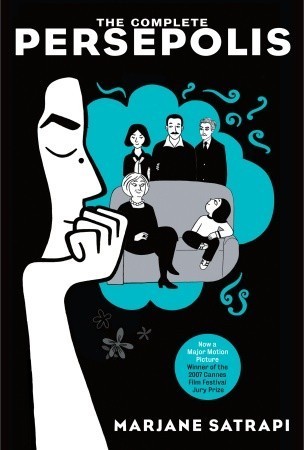What do you think?
Rate this book


341 pages, Paperback
First published January 1, 2003









وقصة عودة، من الثمانيانت وحتي أوائل التسعينات إبان حرب العراق والكويت.. حيث نتابع تحول الفتاة اثناء دراستها بالخارج إلى مراهقة ثم شابة في رحلة ذهاب للبحث عن النفس...وعودة مرة أخري الي ايران في التسعينات..وقت حرب الخليج
الجزء الأول: قصة طفولة



ولعل أكثر ما جعلني أمنح هذا الجزء 5 نجوم كاملة هو جمال علاقة الوالدين مع مورجان، وحكاياتها مع جدتها
الجزء الثاني : قصة عودة

النهاية



My mother left me. I’m sure that she understood the misery of my isolation. Even if she kept a straight face and gave nothing away. She left me with a bag of affection that sustained me for several months.Marjane Satrapi has repeatedly highlighted, through talks about Persepolis, how significant it is for her audience to perceive her tale as relatable. She seeks sympathy, not for herself, but for the Iranian people and those who suffer. The ambiguous and simplistic style of her comic panels reflects this desire, much contrary to the more traditional style of twentieth century comics.
I read The Second Sex. Simone explained that if women peed standing up, their perception of life would change. So I tried. It ran lightly down my left leg. It was a little disgusting. Seated, it was much simpler. And, as an Iranian woman, before learning to urinate like a man, I needed to learn to become a liberated and emancipated woman.Satrapi’s account of the Iranian revolution is told from a unique perspective. She narrates the story from her perspective as a child. She pairs her story with a hand-drawn visual supplement that is reminiscent of a children’s book. Satrapi doesn’t avoid subjects, but her use of words and image are simplified the way a child would view events. When Satrapi explains the horrific torture that the prisoners of war experience she inserts a childlike perspective: One man was burnt with an iron, and Marjane is pictured looking at the iron her mom is using. The effect of this humanizes horrific events. Also it highlights the unnaturalness of torture by paralleling the intended function of an iron, with its domestic use. This child perspective appeals more to the emotions than political or logistic readers.
Member of the Guardians of the Revolution (MGR): Madam, why were you running?One of the first popular conceptions that comes to my mind when I think on Iran is how bad the women in that country have it. Now, the Wikipedia page for Rape culture states: According to Michael Parenti, rape culture manifests through the acceptance of rapes as an everyday occurrence, and even a male prerogative. It can be exacerbated by police apathy in handling rape cases, as well as victim blaming, reluctance by the authorities to go against patriarchial cultural norms, as well as fears of stigmatization from rape victims and their families. That description is the United States, complete with dress codes, lack of sexual education regarding consent, incidents such as Steubenville and statistics such as 1 in 5 women in universities have been raped at some point during their enrollment. This commentary has nothing to do xenophobia of the civilized countries of the so called West, or with Iran consisting of all kinds of people worn down by death and fear and love of their homeland and culture being controlled by Persian fundamentalists, or the CIA's involvement in taking down countries so as to slake the US's lust for oil, or the fundamental differences between Iran and Iraq and Kuwait and all those other countries media crews love to lump together and poke at, but it does have to do with my basis for relating with Marjane and her growth from child to adult. In comparison to the big picture of her story, it's not much, but it is enough to get me off my commonly accepted high horse of US superiority and start listening.
Marjane: I'm very late! I was running to catch my bus.
MGR: Yes..but...when you run, your behind makes movements that are...how do you say...obscene!
Marjane: WELL THEN DON'T LOOK AT MY ASS!
I yelled so loudly that they didn't even arrest me.
Marjane: 'I don't want to leave the country right away.'It's a crying shame that it took me this long to read a work that wonderfully cuts to the heart of that vague sensationalism that is the US's treatment of the Middle East. It's an even greater shame that this sort of work is a rare breed in the field of public perception. However, while it may have taken me the length of my own path from childhood to adulthood to experience a good introduction to the reality of things, a start in the right direction is a start.
Reza: 'It's because you are still nostalgic. You'll see, a year from now people will disgust you. Always interfering in things that don't concern them.'
Marjane: 'Maybe so, but in the West you can collapse in the street and no one will give you a hand.'